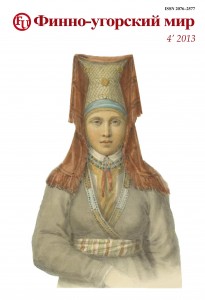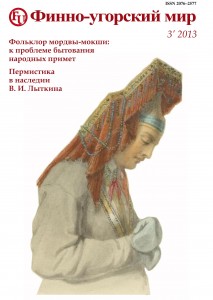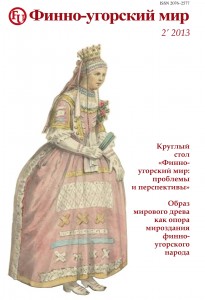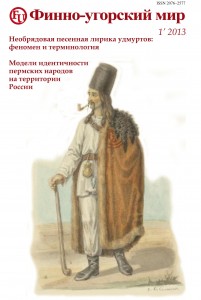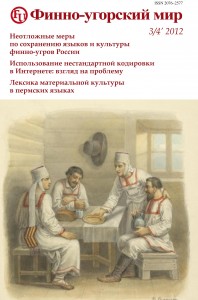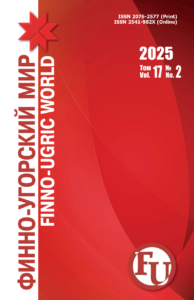LANGUAGE PALETTE
M. V. MOSIN (Saransk, Russia). Studies on Morphology and Syntax of the Mordovia Languages: Current State and Prospects of Development
It analyses the history and current state of the study of morphological and syntactic systems of the Mordovia languages. With the current requirements of the Finno-Ugric and general philology it identifies a number of aspects that require a precise research of linguists in Finno-Ugriс Studies.
Keywords: morphological structure; syntax; word formation; grammar; Mordovian linguistics; sentence structure.
E. A. SHARONOVA, T. V. GERASKIN (Saransk, Russia). Folklore and Historical Contexts in the Legendary Novel “Purgas” by K. G. Abramov
It considers folklore and historical contexts in the legendary novel “Purgas” by K. Abramov. It employs folklore and historical material used by the writer in this work.
Keywords: legendary novel; historical reconstruction; folklore source; Purgas; author’s position.
F. M. LELHOVA (Khanty-Mansiysk, Russia). Verbs Meaning Vertical Motion in the Khanty Language
It considers the verbs meaning vertical motion in the Khanty language, that is the verbs meaning ‘upwards’. For the first time it classifies the verbs of motion of Shuryshkarsky dialect of the Khanty language meaning ‘to climb’.
Keywords: Khanty language; the verb; lexical-semantic classes of verbs; semantics; motion; direction.
O. P. INGLE (Charleston, South Carolina, USA). Finnish Problematic in the Works of William A. Wilson
It considers the works of the American folklorist William A. Wilson on “Kalevala” and Finnish nationalism.
Keywords: Herder; “Kalevala”; folklore; romantic nationalism; national identity; culture and psychology; Finnish ethnicism.
M. V. IVSHINA (Izhevsk, Russia). Symbolic Meaning of Images in Modern Udmurt Drama
It considers the symbolic imagery in the plays of contemporary Udmurt playwrights. In new historical circumstances it allows the literature to actualize traditional themes and conflicts. Artistic symbolism helps create a philosophical implication in the work that connects past and present of the nation, and makes the real events in the play look in generalized abstract sense.
Keywords: modern Udmurt dramaturgy; poetics of myths; literature and folklore; symbol; image.
V. F. ROGOZHINA (Saransk , Russia). On the Means of Expression of Speech Etiquette in the Moksha Language
It studies the means of expression of speech etiquette in the Moksha language basing on the live speech of the Moksha population of the Republic of Mordovia and the language of fiction.
Keywords: etiquette; address; greeting; apology; gratitude; forgiveness.
D. V. TSYGANKIN (Saransk , Russia). Word-building Capacity of Proto-Finno-Ugric Derivational Suffix -ŋ in the Mordovian, Khanty and Mansi Languages
It discusses the potential of the Finno-Ugric (Uralic) derivational suffix -ŋ in the Mordovian, Khanty and Mansi languages.
Keywords: derivational suffix; suffix potency; Khanty language; Mansi language; Mordovian languages.
P. E. SEDOVA (Saransk , Russia). Dialectal Variation in Fiction in the Moksha Language
It touches upon the formation of the dialect basis of the literary Moksha language, and the role of writers enriching it with lexical and grammatical dialect forms.
Keywords: Moksha dialects and literary language; language norm; lexical variation; fiction.
OUR SHARED HISTORY
L. P. ROSHCHEVSKAYA, N. G. LISEVICH (Syktyvkar, Russia). Finno-Ugrian Scholar D. Bubrikh: “ …during my three-year stay in the Komi Republic”
It considers research and administrative work, living and working conditions of future member of the USSR Academy of Science D. Bubrikh during his evacuation to Syktyvkar.
Keywords: The Great Patriotic War; the daily life of evacuees; Finno-Ugrian scholar D. Bubrikh.
G. A. NIKITINA (Izhevsk, Russia). Ethno-social Portraits of Udmurt Women in Beginning of the 1930-s: the 110th Anniversary of V. Belitser
The article gives the analysis of the original materials of V. Belitser found in St. Petersburg branch of RussianAcademy of Sciences’ archive. They provide social portraits of Udmurt women in beginning of the 1930-s: a collective farmer and an individual one.
Keywords: V. Belitser’s manuscript; Udmurt village; collectivization; the formation of a new type of Udmurt woman – a collective farmer; portrait of an individual farmer.
T. V. YUZYKAYN (Syktyvkar, Russia). Organizational Structure of the Youth Movement of the Finno-Ugric Peoples in the Late XX – Early XXI Century
The article discusses associative members of the Youth Association of Finno-Ugric peoples. The main issues cover the following ones: population dynamics of the organization members, characteristics of associate members’ activities, regional structure. It emphasizes the role of the youth ethnic organizations in the youth Finno-Ugric movement of Komi, Mari and UdmurtRepublics.
Keywords: Finno-Ugric peoples; MAFUN (Youth Association of Finno-Ugric peoples); youth movement of the Finno- Ugric peoples; the youth; youth national organization.
L. V. VASILKINA, I. A. ZETKINA (Saransk, Russia). Passionary Personalities in Regional and Cultural Space: M. E. Evsevev, T. D. Nadkin
The article evaluates the roles of the key figures in the process of culture development of Mordovian region in the light of the theory of passionarity.
Keywords: globalization; Mordovian region; regional culture; passionate personality; passionarity.
TREASURY OF TRADITIONAL CULTURE
M. A. MASTINA (Saransk, Russia). Symbol’s Effect as a Recognition Mechanism of the Ritual
It studies the features of Mordovian ritual culture. It shows the ritual structure and the notion of repeatability, an informational value of the ritual.
Keywords: ritual; mnemonic symbols; semiotic systems; memory; known information reproduction; immutability of paradigm meanings; world models.
V. I. SPODINA (Khanty-Mansiysk, Russia). Ritual and Ceremonial Practices Referred to the Worship of Universe Objects as an Axiosphere Integrator of the Ethnic Culture
The article analyzes ritual practices of Ob-Ugric and Samoyed peoples as a basis for the formation and the retention of valuable behavioral settings. It proves he maintenance of the rituals associated with the worship to the spirits of sky, Earth, water, and fire to contribute to the formation of stable behavioral and meaningful relationship to the world.
Keywords: Gods; spirits; sacrifice; worldview; ritual; traditional culture; values; behavior patterns.
N. V. BORTNIKOVA (Izhevsk, Russia). Tangible Medium of Traditional Udmurt Symbols
It provides a comprehensive art analysis of the traditional layout and common household details of the icon (altar) corner of Udmurt home. The icon corner was the core component of spiritual and ideological component of Udmurt national culture, which reflects the traditional material objects of everyday life, woven textiles, and typical semantic ornamental motifs.
Keywords: national culture; traditional domestic furniture setting; tangible media; iconic symbols; icon corner.
FINNO-UGRIC PEOPLES IN CHANGING WORLD
N. V. SHUMKOVA, N. P. KASATKINA (Saransk, Russia). Features of Ethno-Cultural Education in Saransk Preschool Educational Institutions
Basing on the content analysis survey it discusses the specific features of the organization of ethno-cultural education in Saransk preschool educational institutions.
Keywords: preschool educational institution; ethno-cultural education; content analysis; educational program.
I. G. NAPALKOVA, A. N. CHEKUSHKIN (Saransk, Russia). Evolution of Political and Legal Status of Finno-Ugric Peoples in Russia
On the example of the Finno-Ugric peoples of Russia it shows the evolution of the political and legal status. It emphasizes its specific features in different periods of state development.
Keywords: national policy; political and legal status; conflict potential; Finno-Ugric peoples; national and cultural development; national movement; national and cultural autonomies.
O. I. AVERINA, N. A. GORBUNOVA, I. F. MERKULOVA (Saransk, Russia). Development of Ethnical Economics – the Factor to Ensure Economic Stability of the Republic of Mordovia
It studies the characteristic features of ethnic economics as a factor to ensure financial stability and competitiveness in the region. It defines the main trends in the development of ethnic economics in the Republic of Mordovia.
Keywords: ethnic economics; national arts and crafts; Finno-Ugric territories; competitiveness; methodology of SWOT analysis; financial stability.
O. A. BOGATOVA (Saransk, Russia). Formation of Sociocultural Images of Finno-Ugric Republics in the Discourse of Federal Media
On the example of Mari El, Mordovia and Udmurtia it explores the social mechanisms of the formation of ethno-cultural public image of the region in the Russian social media. It shows the formation of ethno-cultural specific features of the image of the region in the Finno-Ugric republics of the Volga Federal District, including branding strategies and their ethno-cultural components.
Keywords: socio-cultural image of the region; regional branding; media discourse; Finno-Ugric peoples; center and periphery; republics of the Russian Federation.
M. A. ELDIN (Saransk, Russia). Spiritual Traditions in Finno-Ugric Religious Environment in Middle Volga Region
It proves the relevance to study religious culture, moral traditions and values of the Volga peoples and defines the prospects for the research (interpretation).
Keywords: religious culture; peoples of the Volga region; self-formation of morality; Russian ethnicities; intellectual culture.
E. A. KOVAL (Saransk, Russia). Interfaith Dialogue in Finno-Ugric Space: Normative Base for the Involvement of Russian Orthodox Church
This article analyzes the normative bases for the participation of Russian Orthodox Church in interfaith dialogue at the present stage. The author emphasizes the importance of ethical behavior triggers and sides interaction in the interfaith dialogue.
Keywords: interfaith dialogue; Russian Orthodox Church; regulations; law; morality.
L. N. POTAPOVA, V. N. YASHKINA (Saransk, Russia). Use of Program-Target Method for Solving Livestock Problems (on the example of the Republic of Mordovia)
It considers the problems of livestock development of in the Republic of Mordovia caused by the provision of epizootic environment on its territory, and its solutions. It evaluates the cost-effectiveness of the program “Ensuring epizootic animal health and well-being of the Republic of Mordovia for 2014–2016 years”.
Keywords: program-target method; agriculture of the Republic of Mordovia; livestock.
V. V. MITROKHIN, I. K. SIMAEVA (Saransk, Russia). Taxonomic Efficiency Analysis of Banking Policies of Credit Institutions in the Republic of Mordovia
It shows the conducted analysis of commercial banks in Mordovia. It gives the methodical approach of evaluating the effectiveness of banking policy on the basis of the construction of the integral index that is taxonomic ratio of development.
Keywords: Efficiency; regional credit institutions; taxonomic factor.
EVENTS, PEOPLE, BOOKS
N. S. MOROVA (Yoshkar-Ola, Russia). Master of subtle matter of Finno-Ugric World
S. V. SHEYANOVA (Saransk, Russia). Enriching the national traditions of psychological prose novel by E. Chetvergova “Tese dy toco” (“Here and There”)

